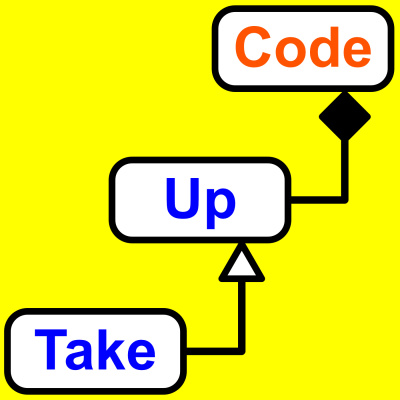Sinopsis
Take Up Code is a podcast that explains computer programming topics through fun and engaging examples that you can relate to. The guided format allows you to gain valuable understanding of topics that will reinforce your studies, allow you to train new skills that you can apply on your job, and change your thinking about what it takes to become a professional programmer. The episodes are as short as possible so you can squeeze them into your daily routine.
Episodios
-
97: Multithreading. The Big Event.
27/04/2016 Duración: 08minThere is more to working with multithreading than locking code and avoiding deadlocks. You also need to know how to synchronize activities. It is not so hard once you understand.
-
96: Multithreading. Thoughtful Designs.
26/04/2016 Duración: 10minThe design decisions you make affect not only how well you can maintain your code but also how well others can use your code. Multithreading adds a new dimension to your designs and I will give you some of my thoughts in this episode.
-
95: Multithreading. When Neither Side Budges.
25/04/2016 Duración: 11minDeadlocks are another common problem with multithreading. I will explain how you can get into this situation and how to change your code to avoid the problem.
-
QA Friday 2016-Apr-22
22/04/2016 Duración: 08minWhat makes a good personal programming side project?
-
94: Multithreading. The Race Is On.
21/04/2016 Duración: 13minAnytime a thread tries to access some memory or resource that another thread can change, you have a race condition. There is no winner for this kind of race. The whole application will lose.
-
93: Multithreading. When Should You Use It?
20/04/2016 Duración: 09minDo you know when to use multithreading? What are the advantages and disadvantages?
-
92: Multithreading. Why Should You Care?
19/04/2016 Duración: 10minThere are several ways to make better use of the capabilities of your computer. Multiple threads allow your application to perform multiple things at the same time. With this power comes a lot of responsibility and you should also realize that it is not the answer to everything.
-
91: Round Robin. Nobody Starves.
18/04/2016 Duración: 10minWhenever your application has several things to do, you need to figure out how to schedule those things. This episode explains a common technique called a round robin that gives everything a fair share.
-
QA Friday 2016-Apr-15
15/04/2016 Duración: 08minAfter working 8 hours, how can I learn to program in the evening?
-
90: Design Patterns: Object Pool.
14/04/2016 Duración: 11minThe object pool behavioral pattern allows you to reuse objects instead of destroying them and creating them again.
-
89: Design Patterns: Dirty Flag.
13/04/2016 Duración: 11minThe dirty flag behavioral pattern allows you to avoid expensive operations that would just need to be done again anyway.
-
88: Design Patterns: Service Locator.
12/04/2016 Duración: 11minThe service locator behavioral pattern allows you to make use of an interface without knowing what class implements the interface.
-
87: Design Patterns: Event Queue.
11/04/2016 Duración: 14minThe event queue behavioral pattern allows you to keep track of work that needs to be done and let some other code actually perform the task.
-
-
86: Design Patterns: Component.
07/04/2016 Duración: 12minThe component behavioral pattern allows you to add just the features to your objects that are needed and keep the features independent of each other.
-
85: Design Patterns: Subclass Method.
06/04/2016 Duración: 10minThe subclass method behavioral pattern allows many different subclasses to define their own behavior while reusing common functionality from the base class.
-
84: Design Patterns: Update Method.
05/04/2016 Duración: 11minThe update method behavioral pattern works with the previous game loop pattern and lets you manage the behavior of multiple game characters.
-
83: Design Patterns: Game Loop.
04/04/2016 Duración: 15minThe game loop behavioral pattern is essential in games and simulations to make the actions proceed at the proper speed regardless of what the user is doing or how fast the computer is.
-
-
82: Design Patterns: Double Buffer.
31/03/2016 Duración: 11minThe double buffer behavioral pattern allows multiple changes to all appear to occur at the same time.

































